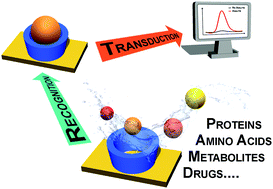当前位置:
X-MOL 学术
›
Chem. Soc. Rev.
›
论文详情
Our official English website, www.x-mol.net, welcomes your feedback! (Note: you will need to create a separate account there.)
Biochemical sensing with macrocyclic receptors
Chemical Society Reviews ( IF 46.2 ) Pub Date : 2018-09-03 00:00:00 , DOI: 10.1039/c8cs00271a Roberta Pinalli 1 , Alessandro Pedrini , Enrico Dalcanale
Chemical Society Reviews ( IF 46.2 ) Pub Date : 2018-09-03 00:00:00 , DOI: 10.1039/c8cs00271a Roberta Pinalli 1 , Alessandro Pedrini , Enrico Dalcanale
Affiliation

|
Preventive healthcare asks for the development of cheap, precise and non-invasive sensor devices for the early detection of diseases and continuous population screening. The actual techniques used for diagnosis, e.g. MRI and PET, or for biochemical marker sensing, e.g. immunoassays, are not suitable for continuous monitoring since they are expensive and prone to false positive responses. Synthetic supramolecular receptors offer new opportunities for the creation of specific, selective and cheap sensor devices for biological sensing of specific target molecules in complex mixtures of organic substances. The fundamental challenges faced in developing such devices are the precise transfer of the molecular recognition events at the solid–liquid interface and its transduction into a readable signal. In this review we present the progress made so far in turning synthetic macrocyclic hosts, namely cyclodextrins, calixarenes, cucurbiturils and cavitands, into effective biochemical sensors and the strategies utilized to solve the above mentioned issues. The performances of the developed sensing devices based on these receptors in detecting specific biological molecules, drugs and proteins are critically discussed.
中文翻译:

大环受体的生化传感
预防保健要求开发廉价、精确和非侵入性的传感器设备,用于疾病的早期检测和持续的人口筛查。用于诊断的实际技术,例如MRI 和 PET,或用于生化标记传感,例如免疫测定不适合连续监测,因为它们价格昂贵且容易出现假阳性反应。合成超分子受体为创建特定的、选择性的和廉价的传感器设备提供了新的机会,用于生物传感有机物质复杂混合物中的特定目标分子。开发此类设备面临的基本挑战是分子识别事件在固液界面的精确转移及其转化为可读信号。在这篇综述中,我们介绍了迄今为止在将合成大环主体(即环糊精、杯芳烃、葫芦脲和空洞体)转化为有效的生化传感器方面取得的进展,以及用于解决上述问题的策略。
更新日期:2018-09-03
中文翻译:

大环受体的生化传感
预防保健要求开发廉价、精确和非侵入性的传感器设备,用于疾病的早期检测和持续的人口筛查。用于诊断的实际技术,例如MRI 和 PET,或用于生化标记传感,例如免疫测定不适合连续监测,因为它们价格昂贵且容易出现假阳性反应。合成超分子受体为创建特定的、选择性的和廉价的传感器设备提供了新的机会,用于生物传感有机物质复杂混合物中的特定目标分子。开发此类设备面临的基本挑战是分子识别事件在固液界面的精确转移及其转化为可读信号。在这篇综述中,我们介绍了迄今为止在将合成大环主体(即环糊精、杯芳烃、葫芦脲和空洞体)转化为有效的生化传感器方面取得的进展,以及用于解决上述问题的策略。



























 京公网安备 11010802027423号
京公网安备 11010802027423号